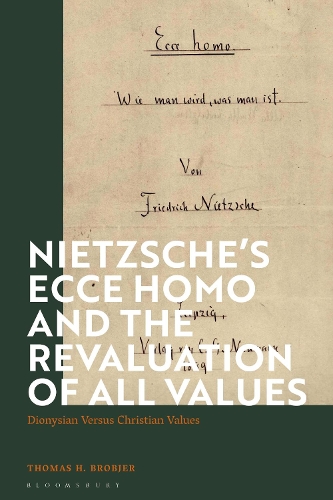
Nietzsches 'Ecce Homo' and the Revaluation of All Values: Dionysian Versus Christian Values
(Hardback)
Available Formats
Publishing Details
Nietzsches 'Ecce Homo' and the Revaluation of All Values: Dionysian Versus Christian Values
By (Author) Thomas H. Brobjer
Bloomsbury Publishing PLC
Bloomsbury Academic
21st October 2021
United Kingdom
Classifications
Tertiary Education
Non Fiction
Philosophy of religion
Philosophical traditions and schools of thought
193
Physical Properties
Hardback
210
Width 156mm, Height 238mm, Spine 18mm
474g
Description
Challenging the standard interpretation of Nietzsches last published work, Ecce Homo, as frivolous autobiography, Thomas H. Brobjer provides an original and detailed analysis of Ecce Homo as fundamental to Nietzsches unfinished masterwork on the revaluation of all values. Arguing that Ecce Homo laid the foundations for his planned four-volume work on values, Brobjer draws together the intentions and motivations behind Nietzsches late work to create a new narrative on it. He situates this period in the desire to undermine the system of Christian values that Nietzsche believed were unchecked as the standard moral gauge for his time. To engage in this project, Brobjer shows that it was essential for Nietzsche to explore the self and life-denying qualities of a Christian system of values within a broader framework of ideas about morality, altruism, egotism, pessimism, humility and pride. By fully outlining the context of Ecce Homo, Brobjer provides a complete corrective to its reception as a self-referential and eccentric text of little philosophical significance, enabling a new understanding within the history of philosophy and Nietzsches oeuvre.
Reviews
Thomas Brobjers book on Ecce homo presents Nietzsches autogenealogy in a provocative new way. It is a challenge particularly for Anglophone Nietzsche scholars engaged in rather scholastic debates. The study demonstrates how Ecce homo is intended to prepare Nietzsches late main project of a transvaluation of all values (Umwerthung aller Werthe) and how this project has to be reconsidered. * Andreas Urs Sommer, Professor of Philosophy and Executive Director of the Nietzsche Research Center, University of Freiburg, Germany *
Brobjer avoids dichotomising between Ecce Homo as autobiography and as a philosophical work, recognising the interconnection between Nietzsches life and philosophy. Employing thorough analysis of letters and drafts, Brobjer takes a distinctive approach to Ecce Homo as preparing a revaluation of values, while advancing important reflections on the symbol of Dionysius. * Katrina Mitcheson, Senior Lecturer in Philosophy, University of the West of England, UK *
Author Bio
Thomas H. Brobjer is Professor of Intellectual History at Uppsala University, Sweden.
